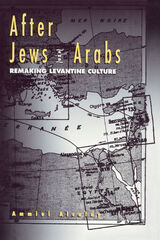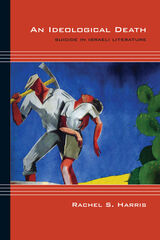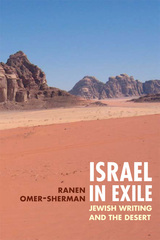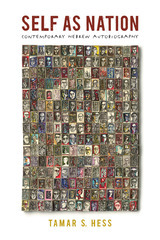4 books about Israeli literature

After Jews And Arabs
Remaking Levantine Culture
Ammiel Alcalay
University of Minnesota Press, 1992
By exposing the rich and diverse textual and cultural legacy of this time and space, Alcalay reassesses the exclusion of Semitic culture in Europe from the perspective of contemporary Arabic culture and opposing images of the Israeli-Palestinian conflict. This book will compel a revision of Jewish studies by placing contemporary Israeli culture within its Middle Eastern context and the terms of colonial, postcolonial, and multicultural discourse.
[more]

An Ideological Death
Suicide in Israeli Literature
Rachel S. Harris
Northwestern University Press, 2014
An Ideological Death: Suicide in Israeli Literature explores literary challenges to Israel’s national narratives. Many prominent Israeli writers use their fiction to confront the centrality of the army, the mythology of the “new Jew,” the positioning of Tel Aviv as the first Israeli city, and the very process by which a nation’s history is constructed.
Yehudit Katzir, Etgar Keret, Amos Oz, Yaakov Shabtai, Benjamin Tammuz, and A. B. Yehoshua are among the writers who engage with depictions of suicide in a critical and rhetorical process that reconsiders myths at the heart of the Zionist project. In Israeli literature, suicide is linked to a society’s compulsion to create impossible ideals that leave its populace disappointed and deluded. Yet, as Rachel S. Harris shows, even at their harshest these writers also acknowledge the idealism that helped build Israel as a modern nation-state.
Yehudit Katzir, Etgar Keret, Amos Oz, Yaakov Shabtai, Benjamin Tammuz, and A. B. Yehoshua are among the writers who engage with depictions of suicide in a critical and rhetorical process that reconsiders myths at the heart of the Zionist project. In Israeli literature, suicide is linked to a society’s compulsion to create impossible ideals that leave its populace disappointed and deluded. Yet, as Rachel S. Harris shows, even at their harshest these writers also acknowledge the idealism that helped build Israel as a modern nation-state.
[more]

Israel in Exile
Jewish Writing and the Desert
Ranen Omer-Sherman
University of Illinois Press, 2006
Israel in Exile is a bold exploration of how the ancient desert of Exodus and Numbers, as archetypal site of human liberation, forms a template for modern political identities, radical skepticism, and questioning of official narratives of the nation that appear in the works of contemporary Israeli authors including David Grossman, Shulamith Hareven, and Amos Oz, as well as diasporic writers such as Edmund Jabès and Simone Zelitch.
In contrast to other ethnic and national representations, Jewish writers since antiquity have not constructed a neat antithesis between the desert and the city or nation; rather, the desert becomes a symbol against which the values of the city or nation can be tested, measured, and sometimes found wanting. This book examines how the ethical tension between the clashing Mosaic and Davidic paradigms of the desert still reverberate in secular Jewish literature and produce fascinating literary rewards. Omer-Sherman ultimately argues that the ancient encounter with the desert acquires a renewed urgency in response to the crisis brought about by national identities and territorial conflicts.
In contrast to other ethnic and national representations, Jewish writers since antiquity have not constructed a neat antithesis between the desert and the city or nation; rather, the desert becomes a symbol against which the values of the city or nation can be tested, measured, and sometimes found wanting. This book examines how the ethical tension between the clashing Mosaic and Davidic paradigms of the desert still reverberate in secular Jewish literature and produce fascinating literary rewards. Omer-Sherman ultimately argues that the ancient encounter with the desert acquires a renewed urgency in response to the crisis brought about by national identities and territorial conflicts.
[more]

Self as Nation
Contemporary Hebrew Autobiography
Tamar S. Hess
Brandeis University Press, 2016
Theorists of autobiography tend to emphasize the centrality of the individual against the community. By contrast, in her reading of Hebrew autobiography, Tamar Hess identifies the textual presence and function of the collective and its interplay with the Israeli self. What characterizes the ten writers she examines is the idea of a national self, an individual whose life story takes on meaning from his or her relation to the collective history and ethos of the nation. Her second and related argument is that this self—individually and collectively—must be understood in the context of waves of immigration to Israel’s shores. Hess convincingly shows that autobiography is a transnational genre deeply influenced by the nation’s literary as well as cultural history. This book makes an additional contribution to the history of autobiography and contemporary autobiography theory by analyzing the strategies of fragmentation that many of the writers Hess studies have adopted as ways of dealing with the conflicts between the self and the nation, between who they feel they are and what they are expected to be. Hess contrasts the predominantly masculine tradition of Hebrew autobiography with writings by women, and offers a fresh understanding of the Israeli soul and the Hebrew literary canon. A systematic review of contemporary Hebrew autobiography, this study raises fundamental questions essential to the debates about identity at the heart of Israeli culture today. It will interest scholars and students of contemporary Israeli culture, as well as those intrigued by the literary genre of autobiography.
[more]
READERS
Browse our collection.
PUBLISHERS
See BiblioVault's publisher services.
STUDENT SERVICES
Files for college accessibility offices.
UChicago Accessibility Resources
home | accessibility | search | about | contact us
BiblioVault ® 2001 - 2024
The University of Chicago Press









